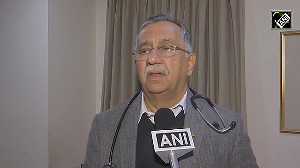People in India and around the world are drawing attention to the global water crisis - and promoting solutions that ensure water is a public good, not a commodity to be bought and sold. Corporate accountability and public health advocates are raising awareness and concern about the increasing corporate control of water.
By 2025, the United Nations anticipates two-thirds of the world's people will struggle to find water. Water access is projected to be one of the dominant factors in global conflicts during this century.
"Corporations are contributing to, and then profiting from, the global water crisis," said Kathryn Mulvey, executive director of Corporate Accountability International(www.stopcorporateabuse.org). She stressed further that "one of the greatest threats to people's access to water today is that corporate use of water is often prioritized over people's daily use."
As water becomes more precious, corporations like Coke, Pepsi, Nestlé, Suezand, and Veolia are increasingly trying to control and profit from it. Ironically enough, at the same time, these corporations are trying to position themselves as 'improving' people's access to water.
Ramon Magsaysay Awardee (2002) and noted human rights' activist Dr Sandeep Pandey says, "equity and rights, cultural and ethical issues are essential to be addressed when dealing with limited water resources. Imbalances between availability and demand, the degradation of groundwater and surface water quality, inter-sectoral competition, interregional and international disputes, all center around the question of how to cope with scarce water resources."
Each year more than 1 billion of our fellow human beings have little choice but to resort to using potentially harmful sources of water. This perpetuates a silent humanitarian crisis that kills some 3900 children every day and thwarts progress towards achieving the Millennium Development Goals.
The consequences of our collective failure to tackle this problem are the dimmed prospects for the billions of people locked in a cycle of poverty and disease.
When people don't have access to safe water, the health impact is devastating. According to the World Health Organization, every year more than 3.4 million people die as a result of water related diseases, making it one of the leading causes of disease and death around the world.
The root of this underlying catastrophe lies in these plain, grim facts: 4 of every 10 people in the world do not have access to even a simple pit latrine and nearly 2 in 10 have no source of safe drinking-water.
To help end this appalling state of affairs, the MDGs include a specific target (number 10) to cut in half, by 2015 the proportion of people without sustainable access to safe drinking-water and basic sanitation.
In addition, the UN Millennium Project Task Force on Water and Sanitation recently recognized that integrated development and management of water resources are crucial to the success or failure of all the MDGs, as water is central to the livelihood systems of the poor.
Kofi Annan, former UN Secretary General, also stressed on integrated approaches to sustainable development. Kofi Annan said that "we shall not finally defeat AIDS, tuberculosis, malaria, or any of the other infectious diseases that plague the developing world until we have also won the battle for safe drinking-water, sanitation and basic health care."
As natural rights, water rights are usufructuary rights (water can be used but not owned ). People have a right to life and the resources that sustain it, such as water. The necessity of water to life is why, under customary laws, the right to water has been accepted as a natural, social fact.
That is why governments and corporations cannot alienate people of their water rights. Water rights come from nature and creation. They flow from the laws of nature, not from the rules of the market.






 © 2025 Rediff.com -
© 2025 Rediff.com -